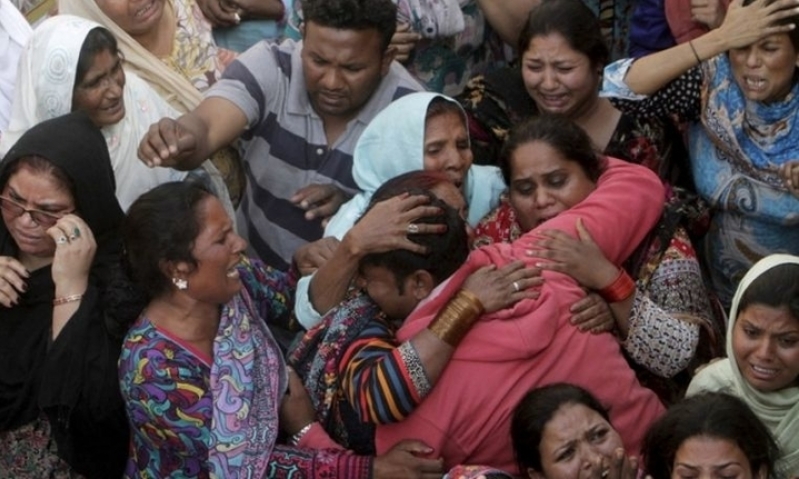
A Christian sanitation worker in Pakistan died on Thursday (June 1) after Muslim doctors refused to treat him for poisonous gas he was exposed to in a sewer, sources said.
Doctors at Civil Hospital Medical refused to treat 28-year-old Irfan Masih of Umerkot City, Sindh Province, saying they did not want to touch the filth-covered worker during the Islamic month of Ramandan, Masih's brother told Morning Star News.
Babar Masih said that his brother entered a deep manhole to clear a sewage line but smelled poisonous gas and called out for help.
"Irfan's coworkers did not have the equipment to pull him out, so another worker, Yaqoob Masih, descended into the manhole to rescue him," he said. "However, both men inhaled the fumes and fainted. Two other Christian sanitary workers, Faisal Masih and Shaukat Masih, went after them but they also fainted."
Area passers-by managed to rescue the four men, who were taken to Umerkot Civil Hospital, he said. The doctors on duty, however, said they were fasting and would not touch the Christian, who was covered in sewage filth, he said.
"The doctors said they refused to treat him because they were fasting and said he was 'napaak [unclean],'" Baba Masih said.
Family members cleaned Masih's body, he added, after which the doctors sent for an oxygen cylinder.
"But the cylinder was empty" he said. "And, before they could arrange another cylinder, he died."
The family then held a protest, carrying his body from the hospital to the Umerkot Press Club, where they demonstrated for about 10 hours, demanding the registration of a criminal case.
Based on a complaint by Irfan Masih's father, Nazeer Masih, Umerkot Police registered a case on Friday (June 2) against Civil Hospital Medical Superintendent Jam Kunbhar, a medical officer identified only as Yusuf and duty doctor Allahdad Rathore, and three employees of the Umerkot Municipal Committee - Sanitation Inspector Behari Lal, Khalid Khoso and Sarwan Malhi. Kunbhar was reportedly arrested.
The doctors are accused of criminal negligence and manslaughter under sections 319 and 34 of the Pakistan Penal Code, for allegedly refusing Irfan Masih treatment.
Health Director General Akhlaq Khan reportedly said that after his initial investigation, Irfan Masih's death was not a result of the doctors' negligence, but that they were at fault to some degree.
Officials from the Pakistan Medical Association later carried out a demonstration against the arrest of Kunbhar and case filed against the doctors, claiming that the accusations were fabricated. They threatened to boycott the Outdoor Patient Department and emergency services wards throughout the district if Kunbhar is not released.
Insisting that Masih was alive when he arrived at the hospital, the deceased's family reportedly insisted that after Yusuf looked at him in the emergency room and then went outside.
At the same time, the municipal committee employees are accused of failing to provide him and the other Christian sanitary workers with the necessary safety kits and gear. Protesting workers alleged that Umerkot Municipal Committee officials had forced Irfan Masih and others to work in the manhole without safety gear.
Some 60 Christians are employed by the Umerkot Municipal Committee on daily wages.
"They always threaten us with consequences of losing our jobs if we don't obey their directives," Christian sanitation worker Ghafoor Masih told local media.
The municipal committee's chairman and administrative officers were unavailable for comment.
Several sanitation workers have reportedly lost their lives due to toxic gases in manholes. Overall, hundreds of people have lost their lives working for the Water and Sanitation Agency (WASA), but their families do not receive benefits that other government employees get because the workers lack regular status despite working decades for the department.
Though Christians account for 90 percent of sewage workers and an even high percentage of sweepers, they make up only 2.45 percent of Pakistan's population, which is more than 95 percent Muslim, according to Operation World.
Christian sanitation workers face extremely dangerous work conditions. When sewer lines clog because they are too small, these workers are not provided any protective gear as they sometimes dive 30 to 50 feet below ground into manholes filled with toxic water.
A large proportion of the Christian minority in Pakistan became sanitation workers for historical reasons. Sweeping in pre-Partition India was a job reserved for the lower castes. A large segment of lower Indian castes converted to Christianity after 1850, under British rule, to improve their lives.
The British continued these caste differences in the interests of convenience, economy and efficiency, and the colonial legacy inherited by the government of Pakistan has remained. After partition, even greater numbers of Christians were drawn to this profession; several landless Christian agricultural laborers who migrated to Pakistan took up the task of sweeping and sanitation in large cities in order to survive.
"Christian sanitation workers are discriminated against both by Muslims and by fellow Christians engaged in other professions," said rights activist Shakeel Naz. "Since their work is considered unclean, people tend to look down upon them. It would not be wrong to say that the Christian sanitation workers are treated like animals in Pakistan."
Naz, who also runs a school for poor Christian children in Lahore's Makkah Colony, said that people refuse to shake hands with sanitation workers and do not eat from the same plate as them.
"Even some of our Christian brethren look down on these workers," he said.
Many poor workers, by virtue of being Christian, feel they are left with no choice but to work as sweepers and sanitary workers.
"In many cases, sanitation work is inherited inter-generationally, and Christians associated with this occupation refuse to take up other jobs," he said. "Since a large number of Christian sanitary workers have been killed while cleaning gutters and manholes, the least that the government can do is to provide them with protective gear and proper healthcare facilities."







